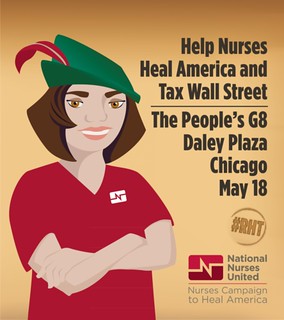 When the leaders of the Western world assemble for a NATO summit meeting, the world press follows and activists see an opportunity to project their messages to a broader audience. Chicago was the site not only for the meeting, but also days of protest on a wide range of issues, most of the actions under the banner of Occupy.
When the leaders of the Western world assemble for a NATO summit meeting, the world press follows and activists see an opportunity to project their messages to a broader audience. Chicago was the site not only for the meeting, but also days of protest on a wide range of issues, most of the actions under the banner of Occupy.
Some of the grievances are clearly tied to the North Atlantic Treaty Organization, members of which have maintained a war in Afghanistan for more than a decade. Activists have lots of reasons for opposing the war, and most were on display during the days of demonstrations. The peace movement in America and the campaign against this war are long standing, well-established, and frustrated. After all, it’s been more than ten years. What’s different this time is the Occupy label.
When Occupy emerged last fall, foreign policy was low on most lists of what it was about. At the top of the long agendas that emerged from General Assembly meetings was economic and political inequality. Linking these concerns to the war isn’t hard to do, and activists were mostly pretty good about doing it. Here’s a bit from the Chicago Tribune’s coverage:
“I think we’re seeing a lot of different concerns,” said Lillian Moats, 65, of Downers Grove earlier as she looked out over a diverse sea of people including self-described anarchists dressed in black and people made up as clowns.
“I think that there’s just a great resonance with the Occupy movement, because if we weren’t spending such outrageous amounts on war, we have money for human needs,” Moats said. “It seems like our country’s priorities are upside down.”
 The antiwar part of the protests included a march on Boeing’s headquarters in downtown, followed by a march to President Obama’s headquarters. Here again the traditional peace movement concerns merged with Occupy’s focus on economic inequality (from Progress Illinois):
The antiwar part of the protests included a march on Boeing’s headquarters in downtown, followed by a march to President Obama’s headquarters. Here again the traditional peace movement concerns merged with Occupy’s focus on economic inequality (from Progress Illinois):
In addition to the products the company makes, Occupy members voiced their concerns about tax subsidies the corporation received from the state and federal government. They also shamed the company for laying off thousands of workers.
“Despite making a profit of $9.7 billion between 2008 and 2010, Boeing laid off 14,862 workers, and it increased executive pay 31 percent,” said an Occupier through a megaphone.
But it wasn’t only peace activists who seized upon the opportunity for exposure provided by the NATO summit. Local Occupy activists concerned with affordable housing were out in force earlier in the week, focusing far less on the military alliance than stopping Cook County Sherriff Tom Dart, foreclosures, and evictions.
Amidst all the issues, activists made proposals beyond saying “no” (stopping war,  evictions, and exploitation). Members of National Nurses United marched and demanded a financial transactions tax. (Adbusters’ Kalle Lasn, who issued the first call to Occupy Wall Street, has made the same proposal.) The nurses said that such a “Robin Hood” tax would raise money that could be used to prevent huge cuts to human services, and make a stab at economic inequality in the process.
evictions, and exploitation). Members of National Nurses United marched and demanded a financial transactions tax. (Adbusters’ Kalle Lasn, who issued the first call to Occupy Wall Street, has made the same proposal.) The nurses said that such a “Robin Hood” tax would raise money that could be used to prevent huge cuts to human services, and make a stab at economic inequality in the process.
The point is that Occupy has become an almost all-purpose umbrella for a wide range of issues and activists, and the NATO summit was a chance to trot out many of them out.
Filed under: Uncategorized Tagged: Adbusters, Afghanistan, antiwar, Barack Obama, Chicago, eviction, foreclosure, Kalle Lasn, labor, media, NATO, nurses, Occupy, peace



















